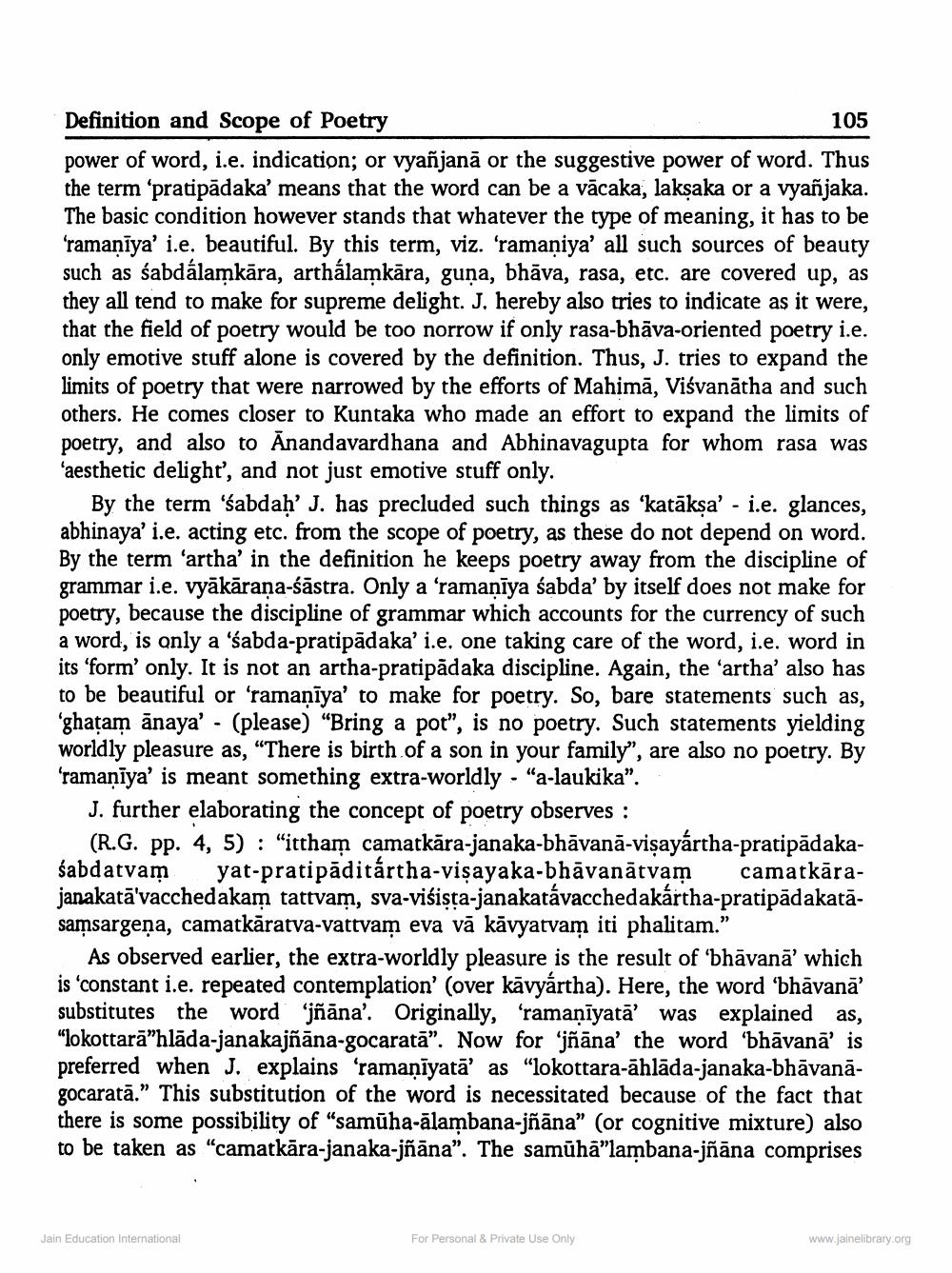________________
Definition and Scope of Poetry
105 power of word, i.e. indication; or vyañjanā or the suggestive power of word. Thus the term pratipadaka' means that the word can be a vācaka, laksaka or a vyañjaka. The basic condition however stands that whatever the type of meaning, it has to be 'ramanīya' i.e. beautiful. By this term, viz. 'ramaniya' all such sources of beauty such as sabdálamkāra, arthálamkāra, guna, bhāva, rasa, etc. are covered up, as they all tend to make for supreme delight. J. hereby also tries to indicate as it were, that the field of poetry would be too norrow if only rasa-bhāva-oriented poetry i.e. only emotive stuff alone is covered by the definition. Thus, J. tries to expand the limits of poetry that were narrowed by the efforts of Mahimā, Viśvanātha and such others. He comes closer to Kuntaka who made an effort to expand the limits of poetry, and also to Anandavardhana and Abhinavagupta for whom rasa was ‘aesthetic delight, and not just emotive stuff only.
By the term 'sabdah' J. has precluded such things as 'katākṣa' - i.e. glances, abhinaya' i.e. acting etc. from the scope of poetry, as these do not depend on word. By the term 'artha' in the definition he keeps poetry away from the discipline of grammar i.e. vyākārana-śāstra. Only a 'ramaniya sabda' by itself does not make for poetry, because the discipline of grammar which accounts for the currency of such a word, is only a 'sabda-pratipadaka' i.e. one taking care of the word, i.e. word in its 'form' only. It is not an artha-pratipadaka discipline. Again, the 'artha' also has to be beautiful or 'ramanīya' to make for poetry. So, bare statements such as, 'ghatam ānaya' - (please) “Bring a por”, is no poetry. Such statements yielding worldly pleasure as, "There is birth of a son in your family", are also no poetry. By 'ramanīya' is meant something extra-worldly - "a-laukika".
J. further elaborating the concept of poetry observes :
(R.G. PP. 4, 5): “ittham camatkara-janaka-bhāvanā-visayartha-pratipādakasabdatvam yat-pratipaditrtha-visayaka-bhāvanitram camatkarajanakatā'vacchedakam tattvam, sva-visista-janakatávacchedakártha-pratipadakat.samsargeņa, camatkāratva-vattvam eva vā kävyarvam iti phalitam.”
As observed earlier, the extra-worldly pleasure is the result of 'bhāvanā' which is constant i.e. repeated contemplation' (over kāvyártha). Here, the word 'bhāvanā substitutes the word 'jñāna' Originally, 'ramanīyatā' was explained as, "lokottarā"hlāda-janakajñāna-gocaratā”. Now for 'jñāna' the word 'bhāvanā' is preferred when J. explains 'ramanīyatā' as “lokottara-āhlāda-janaka-bhāvanāgocaratā.” This substitution of the word is necessitated because of the fact that there is some possibility of "samüha-ālambana-jñāna" (or cognitive mixture) also to be taken as "camatkāra-janaka-jñāna". The samūhā"lambana-jñāna comprises
Jain Education International
For Personal & Private Use Only
www.jainelibrary.org




